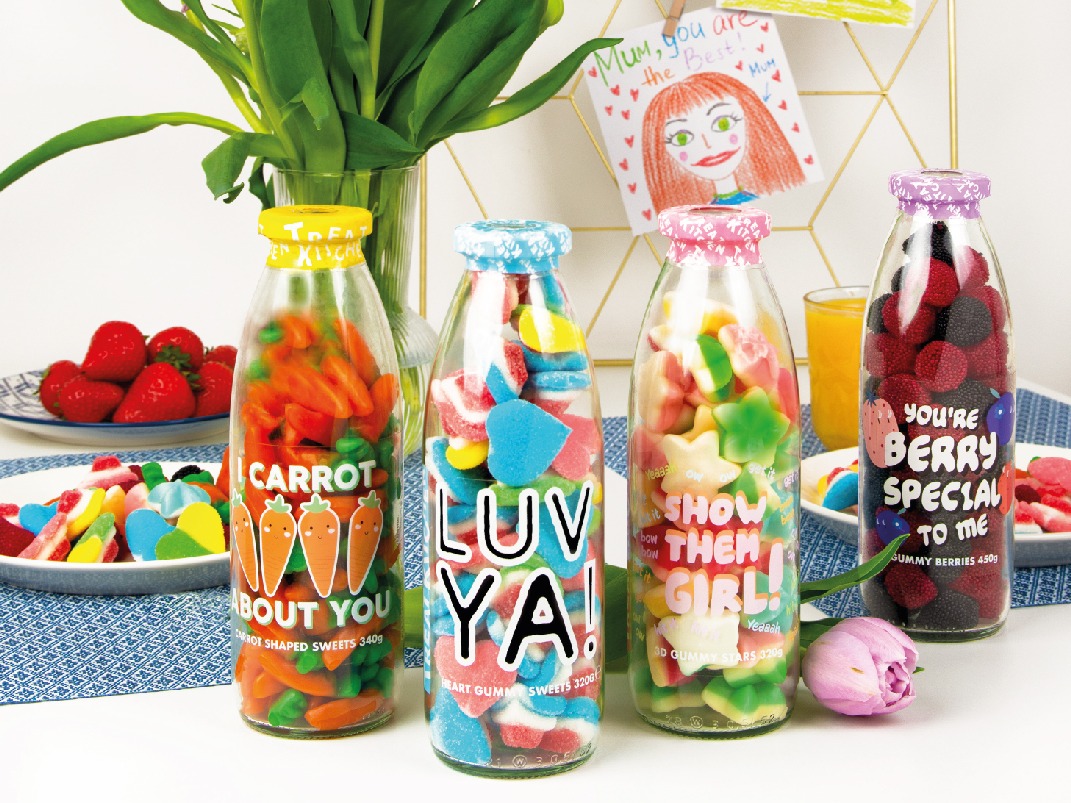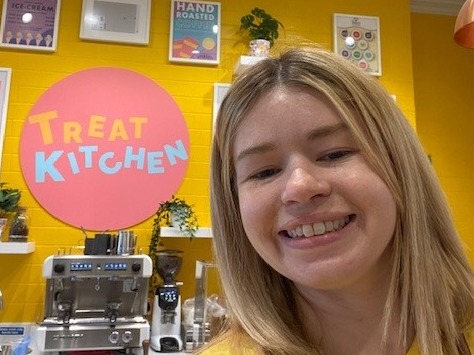Sustainability in Enterprise - TTK Confectionery
How Nottingham brand The Treat Kitchen are reducing the carbon footprint of their packaging, with support from NTU.


The Treat Kitchen are a family-owned, creative food gifting company based in Nottingham, selling to major retailers across 21 countries worldwide. Known for tasty edible gifts that look and taste amazing, The Treat Kitchen specialise in vibrant confectionary presented in eye- catching packaging, often inspired by playful, contemporary trends.
As a business, The Treat Kitchen have always been focused on sustainability. The company have planted over 36,000 trees to offset their team’s carbon footprint at home and at work. Most of their packaging can either be recycled or upcycled, and they have a recycling facility in store for any plastics not yet taken by local authorities, such as their plastic pouches.
Now, The Treat Kitchen are aiming to take it further and embed sustainability across their whole business. Through NTU’s Sustainability in Enterprise project, which is part-funded by the European Regional Development Fund (ERDF), the company have been working closely with NTU’s qualified and experienced Sustainability Consultants to calculate their carbon footprint and put an action plan in place to reduce emissions.
As part of the project, The Treat Kitchen have also been working with NTU’s commercial product design consultants, to see how they can reduce the carbon impact of their packaging.

Jess Barnett, Brand Director at The Treat Kitchen
We spoke to The Treat Kitchen’s Brand Director, Jess Barnett, to find out how they have benefited from the support on offer.
“We want to improve our sustainability and play our part in tackling climate change, because if every business did that, the collective impact would be massive. However, as many SMEs know, it can be daunting knowing where to start. We’d worked with NTU before, so we joined the Sustainability in Enterprise programme to get some real advice we could trust, advice that we knew would be in our best interest. Four members of The Treat Kitchen team are also NTU alumni, including our sustainability champion, Melissa Kelly.
“One of our main challenges is that a lot of our products are currently shipped from overseas, so we don’t have a huge amount of control over sustainability in the manufacturing process. That’s another project for further down the line. But with NTU’s support, we’re exploring the areas we can control. Their commercial product design consultants carried out a lifecycle analysis of the packaging we use for our best-selling product, to see how we could reduce its carbon footprint.”
The Treat Kitchen’s best-seller is their message bottle – confectionary presented in reusable glass bottles featuring word-play style messages on the label, such as ‘You’re as sweet as can be’. The popular product is sold through a variety of retailers including Asda, Sainsbury’s, Urban Outfitters, and House of Fraser, as well as garden centres.
Sean Drummond, Innovation Designer for the Sustainability in Enterprise project explains more about the product lifecycle analysis.
“We analysed The Treat Kitchen’s existing message bottle to identify potential areas that could be improved from a sustainability perspective. The product lifecycle analysis also determined its total carbon impact, which gave us a baseline figure to work from. We then explored alternative packaging solutions, looking into key factors such as material choice, material quantity, manufacture methods, supplier location, and end of life processes such as recycling. As options were found, they were compared with our initial analysis, and ranked based on their carbon impact.
“The design suggestion we presented to The Treat Kitchen included a lighter glass bottle saving over 45% of the original bottle’s weight, a bottle cap manufactured from biodegradable plant-based plastics, printing artwork direct to the bottle to remove the need for additional stickers, and swapping a heat shrunk plastic cap for an adhesive paper seal. In total, these design suggestions have a potential carbon saving of up to 50% for The Treat Kitchen, which is just fantastic!”
What we’re doing now

Jess shares how the product lifecycle analysis has helped The Treat Kitchen:
“It was very illuminating to see the results as we haven’t looked at our packaging from that perspective before. We’ve always thought of glass as a sustainable packaging option because it’s recyclable and reusable. Sean and his team looked at our message bottle’s whole sustainability journey, from start to finish and showed us how we could cut carbon, from using less glass, to making our bottles lighter to transport.
“The data was so eye-opening and has really roused the interest of our buyer, who is now working through NTU’s suggestions. We’re already working with our printer to make sure the labels on our message bottles are fully recyclable, and that the reels and foils they use in production are biodegradable. We’re also taking the lifecycle approach into account for all our products, not just our message bottles.
“We would never have had the time or skillset needed to do a product lifecycle analysis in- house, so the support we’ve had from NTU’s commercial design consultants has been invaluable.”
The Treat Kitchen have also worked with NTU’s Sustainability Consultant, Rose Playle to establish their baseline carbon footprint and find ways to cut carbon emissions.
Jess explains: “Rose helped us get our head around another one of our big challenges, how to reduce the carbon impact of our leased, higgledy-piggledy 1970s building, which includes four warehouses with offices on top.”
The impact
“The biggest impact of NTU’s support has been the cost saving along with the ongoing help we’ve had."
“The consultancy has opened up the conversation around sustainability and set out what we could do to make an impact within the parameters of a rented space. We’ve set up a green team led by our sustainability champion, Melissa Kelly, to work through and implement Rose’s 29 recommendations. From the simple and attainable instant wins such as switching to energy efficient LED lighting and rewriting our sustainability policy, to longer-term bigger steps such as investing in solar panels.
“Alongside this, we’re working towards achieving a bronze environmental accreditation from Investors in the Environment, and have recently started working with the Canal & Rivers Trust. Melissa is also part of NTU’s peer-to-peer support network, the Sustainability Community Lab, giving her access to a wealth of sustainability know-how and advice.
“The biggest impact of NTU’s support has been the cost saving along with the ongoing help we’ve had. We wouldn’t have been able to afford the equivalent consultancy from the private sector to kickstart our sustainability improvements, and our contribution to sustainability wouldn’t have been so significant.”
How to access the support available
Find out more about the broad range of support that NTU is providing to local businesses:
- Email: workingwithyou@ntu.ac.uk
- LinkedIn: NTU Business and Employers
- Twitter: NTU Business and Employers